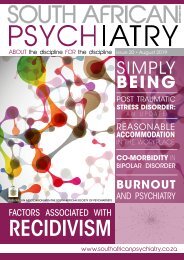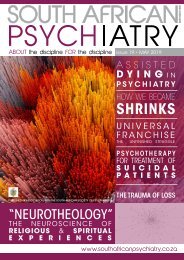South African Psychiatry - February 2019
South African Psychiatry - February 2019
South African Psychiatry - February 2019
You also want an ePaper? Increase the reach of your titles
YUMPU automatically turns print PDFs into web optimized ePapers that Google loves.
SASOP HEADLINE<br />
Esidimeni tragedy; allegations of abuse and human<br />
rights violations at the Tower Psychiatric Hospital in<br />
the Eastern Cape; and the suicide of UCT Health<br />
Sciences Dean Prof Bongani Mayosi following his<br />
battle with depression, all pointed to the need for<br />
the organisation to “rise and answer the call for<br />
advocating on behalf of mental health care users<br />
and our profession”.<br />
Prof Chiliza, who heads the <strong>Psychiatry</strong> Department<br />
of the University of KwaZulu-Natal (UKZN) Medical<br />
School and will serve as SASOP President to<br />
2020, said the organisation would ramp up its<br />
lobbying for mental health care to be allocated<br />
an equitable share of the national health budget.<br />
HE SAID SASOP WOULD ALSO BE DOING<br />
MORE TO ENCOURAGE MEDICAL<br />
STUDENTS TO SPECIALISE IN PSYCHIATRY,<br />
IN ORDER TO GROW THE NUMBERS OF<br />
QUALIFIED PROFESSIONALS ABLE TO<br />
SERVE PUBLIC MENTAL HEALTH CARE<br />
NEEDS.<br />
“Mental health conditions are often misunderstood,<br />
mis-managed and stigmatised, particularly for those<br />
who rely on the public health system for treatment.<br />
They are extremely vulnerable to abuse and SASOP<br />
as the professional body for psychiatrists must take<br />
the lead in ensuring better services to our people.<br />
We will live out the promise we made to society<br />
when we engaged in a social contract with our<br />
community as practising, professional psychiatrists,”<br />
he said.<br />
Prof Chiliza said SASOP was establishing a “robust<br />
Public Sector Executive Committee of senior<br />
psychiatrists in academia and government<br />
services” to guide its efforts to strengthen<br />
psychiatric care in the public health sector.<br />
HE SAID SASOP WOULD CONTINUE<br />
ITS LEADING ROLE IN THE NATIONAL<br />
MENTAL HEALTH ALLIANCE OF NGOS IN<br />
THE MENTAL HEALTH CARE SECTOR AS<br />
A VEHICLE FOR ADVOCACY ON POLICY<br />
AND BUDGET ISSUES AFFECTING MENTAL<br />
HEALTH CARE AND THE PROVISION OF<br />
PROFESSIONAL PSYCHIATRY SERVICES<br />
IN THE PUBLIC SECTOR.<br />
Outlining his vision for SASOP and its contribution<br />
to the profession of psychiatry, Prof Chiliza said<br />
the organisation would also focus on renewing its<br />
leadership transformation efforts, strengthening<br />
the relationship between public and private sector<br />
psychiatry, and supporting early-career psychiatrists.<br />
“We will re-energise our efforts to transform the<br />
leadership of SASOP and psychiatry in general.<br />
The leadership of SASOP will continue to transform<br />
until it is aligned with the demographics of<br />
<strong>South</strong> Africa and is able to fully engage with<br />
issues that plague our country such as racism,<br />
sexism and other forms of discrimination.<br />
We will thus embark on a strategic drive towards<br />
succession planning for all key positions of<br />
leadership in psychiatry,” he said.<br />
Prof Chiliza said that as a scarce resource,<br />
psychiatrists in the public and private sectors<br />
needed to work together, especially in preparing for<br />
the reorganisation of the health care system with<br />
implementation of National Health Insurance (NHI).<br />
“We are already piloting value-based care models<br />
in the private sector. There is no reason why these<br />
pilots cannot be performed in both private and<br />
state sectors,” he said.<br />
On early-career psychiatry, he said he aimed to<br />
grow SASOP by focusing on young psychiatrists,<br />
registrars and medical officers, ensuring that young<br />
doctors had ample opportunity to do internships in<br />
the discipline and “fall in love with psychiatry”.<br />
“We need to push harder for psychiatry to be truly<br />
recognised as a major discipline in undergraduate<br />
medical education,” he said.<br />
PROF CHILIZA SAID SASOP WOULD<br />
LOOK TO INCREASE THE SUPPORT<br />
IT ALREADY OFFERS TO MEDICAL<br />
REGISTRARS IN ORDER TO “FACILITATE A<br />
MORE EQUITABLE TRAINING PLATFORM<br />
FOR ALL REGISTRARS REGARDLESS OF<br />
THE UNIVERSITY AT WHICH THEY ARE<br />
TRAINING”.<br />
Support for early-career psychiatrists would also<br />
extend to assistance in dealing with professional<br />
practice issues such as billing, and mentorship for<br />
young psychiatrists and future academics.<br />
In addition to his position at UKZN, where he is<br />
Associate Professor/Chief Specialist and head of the<br />
Department of <strong>Psychiatry</strong>, Prof Chiliza is a founding<br />
director of Harambee Medical Consulting and the<br />
<strong>African</strong> Global Mental Health Institute, and serves on<br />
a number of NGO Boards including the SA YMCA<br />
and Life Choices.<br />
He has authored over 50 peer reviewed articles<br />
and book chapters and won awards including the<br />
Hamilton Naki Clinical Research Fellowship and the<br />
CINP Rafaelsen Young Investigators Award.<br />
SOUTH AFRICAN PSYCHIATRY ISSUE 18 <strong>2019</strong> * 81
















